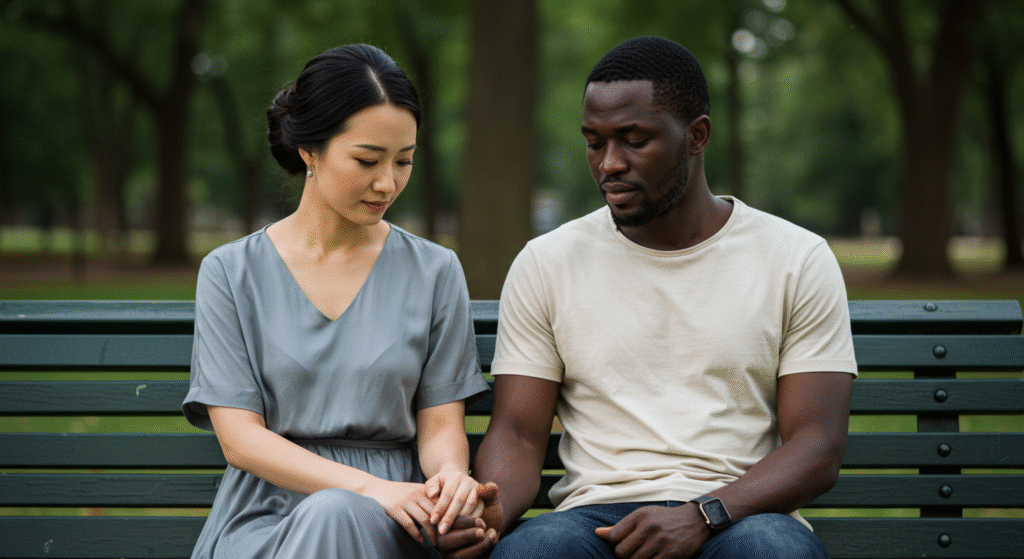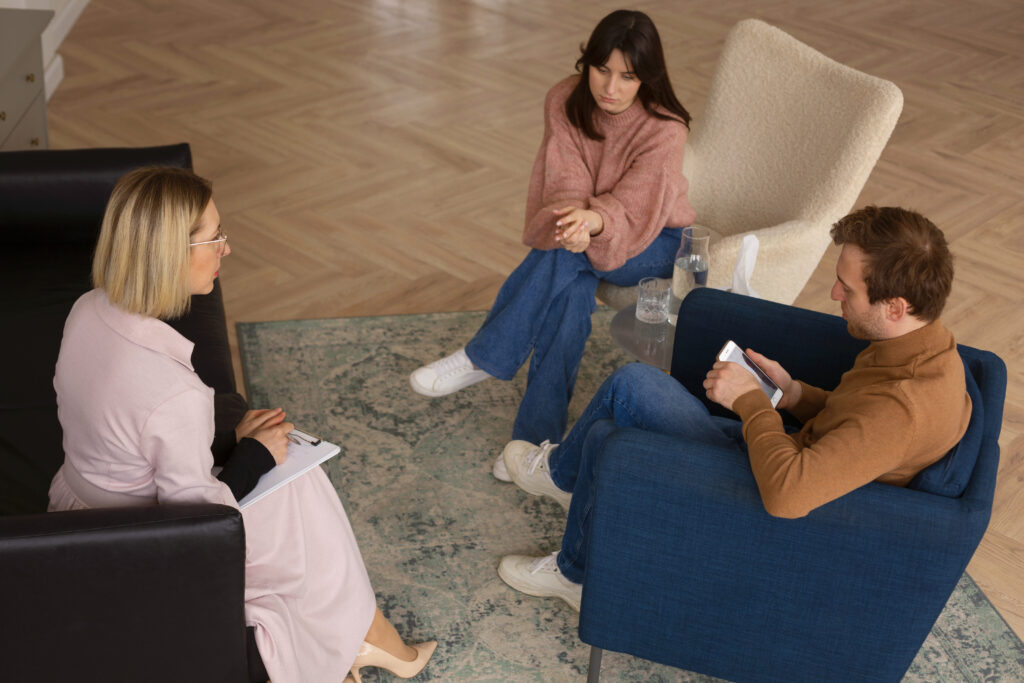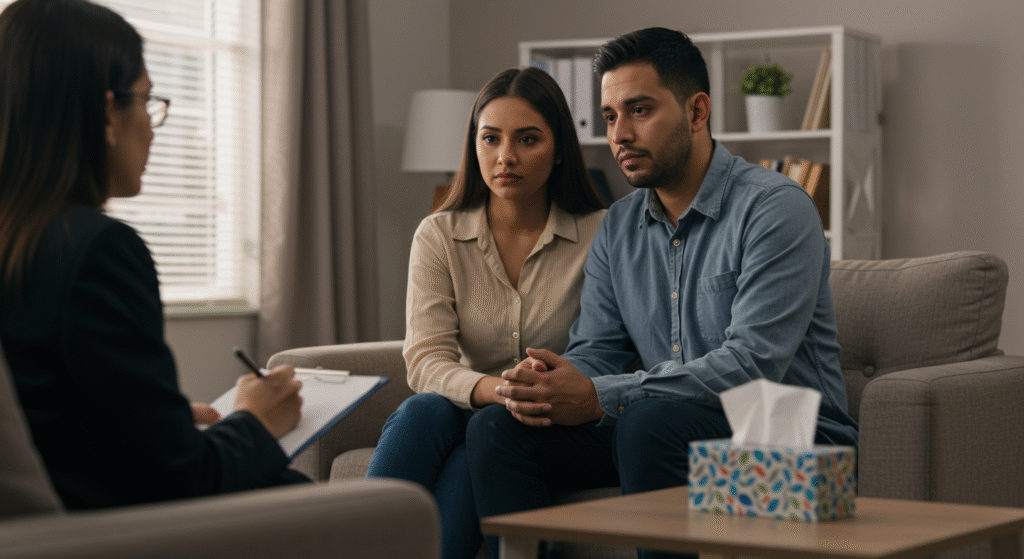Marriage Help for When You’re Afraid to Ask for It

Introduction
Admitting that your marriage needs help can feel like admitting failure.
But in reality, it’s one of the bravest things you can do.
If you’ve been silently struggling—feeling distant from your spouse, pretending everything’s fine, or fearing what others might think—this post is for you. You’re not alone, and you’re not broken. You’re simply human. And asking for help doesn’t mean you’ve failed. It means you care enough to try.
In this post, we’ll walk through why it’s okay to need support, what kinds of help are available (even if therapy feels like too much), and how to take small but meaningful steps toward healing your marriage—with courage, clarity, and grace.
1. The Silent Struggle Behind Closed Doors
 So many couples look fine on the outside—but inside, there’s a growing disconnect. You may smile at church, show up for the kids, and share a home—but not a heart.
So many couples look fine on the outside—but inside, there’s a growing disconnect. You may smile at church, show up for the kids, and share a home—but not a heart.
You may be:
- Sleeping back-to-back
- Avoiding hard conversations
- Feeling more like roommates than lovers
- Crying silently after another unspoken disagreement
And yet, you haven’t told anyone. Why?
Because it feels embarrassing. Because you think you should have it figured out. Because asking for help feels like waving a white flag.
But here’s the truth: Marriage doesn’t fall apart because people seek help—it falls apart when people don’t.
2. Why Asking for Help Feels So Hard
Even when we know things aren’t working, reaching out for help can feel terrifying. But why?
a) Fear of Judgment
We worry about what others will think—friends, family, even our spouse. We don’t want to be “the one with marriage problems.”
b) Fear of Blame
You might fear that asking for help will make your partner defensive or think you’re the problem.
c) Fear of Change
Sometimes, it’s not even the fight you’re afraid of—it’s what happens after the truth is out. What if it changes everything?
d) Fear of Confirmation
Deep down, you might be afraid that if you talk about it, you’ll realize how bad things really are.
All of these fears are valid—but none of them should stop you from getting the support you need. Because your pain deserves a voice. And your marriage deserves a chance.
3. What Asking for Help Actually Means
 Asking for help doesn’t mean you’ve failed.
Asking for help doesn’t mean you’ve failed.
It doesn’t mean your marriage is over.
It doesn’t mean you’re weak.
It means:
- You care deeply.
- You’re willing to fight for connection.
- You know there’s something worth saving.
- You’re courageous enough to tell the truth.
You don’t need to have all the answers. You just need to take one honest step.
4. If You’re Not Ready for Therapy—Here’s What You Can Do
 Therapy is an incredible tool—but it’s not the only starting point. If therapy feels too big, too expensive, or too intimidating right now, you’re not out of options.
Therapy is an incredible tool—but it’s not the only starting point. If therapy feels too big, too expensive, or too intimidating right now, you’re not out of options.
a) Start with a Journal
Writing things down can help you clarify what’s going on inside.
Try prompts like:
- “What hurts the most right now?”
- “What do I wish my partner knew?”
- “What do I need, but haven’t said out loud?”
This isn’t for anyone else. It’s for you—to give language to what’s been buried.
b) Read or Listen to Stories Like Yours
Books, podcasts, and online communities focused on marriage can make you feel less alone—and offer real strategies.
Recommended Resources:
- The 5 Love Languages by Gary Chapman
- Hold Me Tight by Dr. Sue Johnson
- Podcasts like “The Love Hour” or “Anatomy of Marriage”
c) Choose One Safe Person to Talk To
You don’t need to broadcast your marriage struggles to everyone. But consider talking to one trusted, emotionally safe person—a friend, mentor, or coach who will listen without judgment.
5. What If Your Partner Isn’t On the Same Page?
 One of the biggest blocks to asking for help is this:
One of the biggest blocks to asking for help is this:
What if my spouse doesn’t think there’s a problem?
It’s painful when you feel desperate for change, but your partner says, “We’re fine.”
Here’s what you can do:
a) Lead with Emotion, Not Accusation
Instead of: “You never try.”
Say: “I feel really disconnected lately, and I’m scared of where that could lead.”
b) Focus on the Relationship, Not Just Them
Say: “I want us to be better—not because I think you’re a bad partner, but because I miss feeling close.”
c) Get Help for Yourself First
You don’t need your spouse’s permission to get support. Talking to a counselor, coach, or support group solo can help you get stronger, regardless of their willingness (or readiness) to join you.
6. The Power of Small, Brave Steps
 You don’t have to change everything at once. Start small. These gentle shifts can make a big difference:
You don’t have to change everything at once. Start small. These gentle shifts can make a big difference:
- Send your spouse a kind message instead of criticism
- Say what you really feel instead of hiding it
- Take a break when overwhelmed instead of exploding
- Admit, “I don’t know what to do,” and let that be enough for today
Sometimes the bravest thing you can say is:
“I need help.”
Even if you whisper it. Even if you say it only to yourself first.
7. What Healing Can Look Like (Even When It’s Messy)
 Healing doesn’t always come in a dramatic breakthrough. Sometimes, it’s slow. Uneven. Filled with setbacks and small victories.
Healing doesn’t always come in a dramatic breakthrough. Sometimes, it’s slow. Uneven. Filled with setbacks and small victories.
It might look like:
- A tough conversation that doesn’t go perfectly—but was honest
- A moment of laughter that reminds you why you fell in love
- A counseling session that feels awkward, but opens a door
- A shift from silence to curiosity
- A decision to fight for your marriage—not with force, but with tenderness
Healing often starts quietly. But it does start—with a decision to stop hiding and begin reaching.
8. Final Thoughts: You Don’t Have to Carry This Alone
 If you’re afraid to ask for help in your marriage, you’re not weak—you’re human. And you’re not the only one.
If you’re afraid to ask for help in your marriage, you’re not weak—you’re human. And you’re not the only one.
Countless husbands and wives are quietly aching, unsure how to begin. But your heart is speaking. Your pain is valid. Your longing for connection is sacred.
Asking for help isn’t surrendering—it’s standing up for your love.
For your family.
For yourself.
So here’s your permission:
You can speak up.
You can get support.
You can be seen, even in your struggle.
You don’t have to carry this alone anymore.


